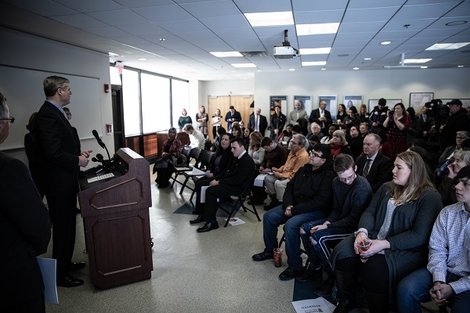
Students who are homeless do not have a bed to return home to each night, instead rely on couch surfing, sleeping in borrowed cars, stairwells, or crashing at a friend’s house.
Sasha Heggie-Jackson, ’16, founder of the Jackson’s Center for Leadership, Advocacy and Supportive Services Inc. knows first-hand how stressful housing insecurity can be.
When pursuing her college degree, she suddenly found herself with no roof over her head.
Due to circumstances beyond her control, Heggie-Jackson was evicted from her apartment and had to rely on “doubling up,” temporarily living where she could with family, friends and other non-relatives.
“It took me a while to gain some stability,” Heggie-Jackson said.
That experience inspired her to help others. As CEO of her own foundation, Heggie-Jackson counsels homeless students on the Bridgewater State University campus.
“I can’t tell you how many times I’ve had conversations with students who don’t know where they are going to live… It’s a bigger problem than people realize,” she said.
There are a variety of reasons why younger people find themselves homeless. Sometimes their family home is not a safe environment, while in other cases parents have closed their doors because they disapprove of their child’s lifestyle or sexual orientation.
“(Homelessness) can happen to anyone. In terms of employment there are no guarantees, you might have something happen medically or an accident you aren’t prepared for,” Heggie-Jackson said.
The state recognizes that some students are struggling and is taking steps to help.
At a Jan. 31 press conference held at Framingham State University, Gov. Charlie Baker and Lt. Gov. Karyn Polito announced the state is providing $3.5 million in grants to address and support housing insecurity. BSU President Frederick W. Clark Jr., Assistant Vice President and Dean of Students Denine Rocco, and Eileen Estudante, director of outreach and special programs attended the event.
A portion of the grant money is allocated to fund the Massachusetts Student Housing Security pilot program, where dorm rooms will be made available to homeless college students including those attending Bridgewater State.
The pilot program launched at four campus sites in January pairs four-year institutions with nearby community colleges: BSU and Massasoit Community College, Framingham State and MassBay Community College, Worcester State University and Quinsigamond Community College and UMass Lowell and Middlesex Community College.
Through the initiative, up to five beds are made available to each pair of participating schools for students experiencing homelessness or housing insecurity.
Rocco said thanks to the pilot program, BSU is currently housing two Massasoit students and three of its own students. The goal is to continue to find funding in order to provide more services and support.
Heggie-Jackson said she is pleased the state is taking steps to address youth homelessness and hopes more can be done.
“The thought often is that if you house a person they will be stable, but there are other components to it,” she said, “I wish the best for this program and hope it takes off. Reach out and listen to these students’ testimonies because they are the ones who know what they need.”
Estudante is the BSU and Massasoit point of contact for the pilot program and encourages students who are experiencing homelessness and housing insecurity to contact her. She can be found in room Boyden room 106, or by phone at 508-531-1276, or email lestudante@bridgew.edu.
More information on other resources and supports BSU offers can be found on the BSU Resources in Support of Excellence (RISE) website. (Story by Heather Harris Michonski, Photos by Carl Hollant, University News and Video)
Do you have a BSU story you'd like to share? Email stories@bridgew.edu.

